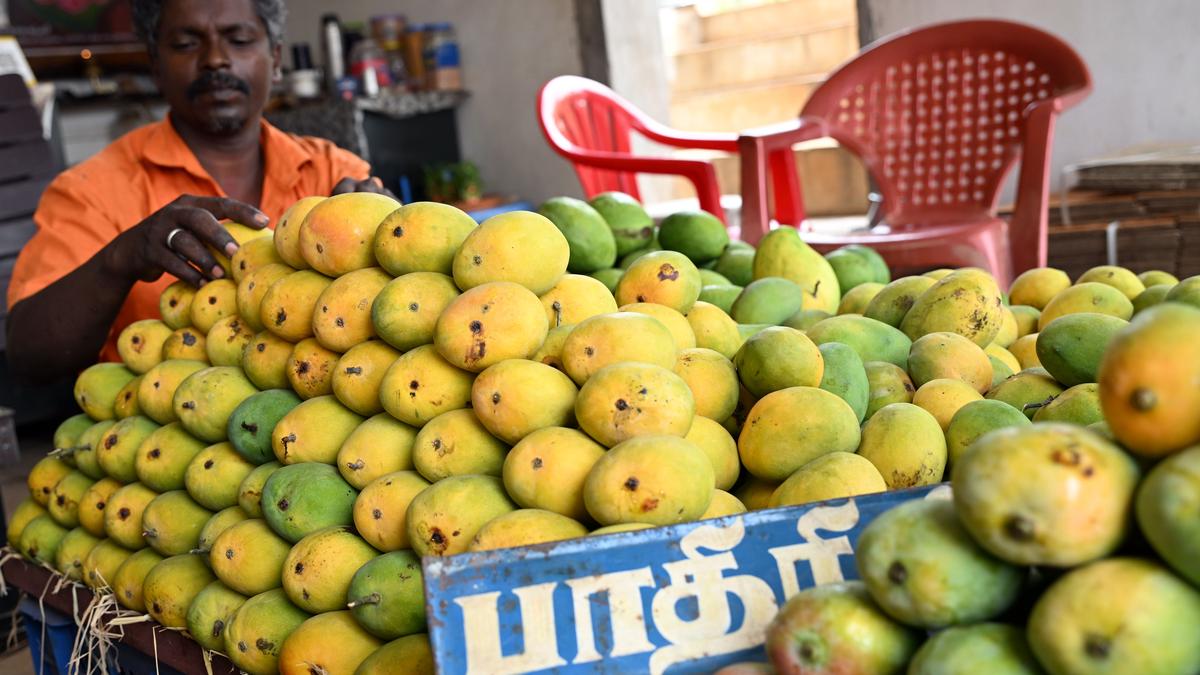
Mangoes in short supply, prices soar in Tiruchi
The Hindu
Mangoes have turned dearer in Tiruchi as the hot weather has affected the cultivation and overall yield in Tamil Nadu, traders and farmers have said
Mangoes have turned dearer in Tiruchi as the hot weather has affected the cultivation and overall yield in Tamil Nadu, traders and farmers have said.
The Tiruchi district, which has 2,000 hectares under mango cultivation, grows Bangloura and Neelam varieties. Senior officials in the Horticulture Department said the heat had affected trees on around 1,700 hectares this year. “We have recorded a 50% decrease in yield in Marungapuri, Vaiyyampatti, and Manpparai, while the remaining blocks have seen a 25% decline,” said an official.
Mango plantations in Pudukottai and other areas had reported a significant amount of flower drop caused by high temperature in the past week.
“This year’s mango season has had a dull start with just one or two tonnes arriving per day. We hope the situation will improve once it rains,” A.M.P. Abdul Hakkim, president, Tiruchi Gandhi Market Anaithu Vyabarigal Pothu Nala Sangam, told The Hindu.
The Senthoora, Imam Pasand, Neelam, Kallamani, and Malgova varieties usually herald the arrival of the mango season that lasts from early May to July. Kallamani is retailing at ₹250-₹300 a kg while Malgova is priced upwards of ₹140 a kg.
Gandhi Market has approximately 20 wholesalers and 250 retailers dealing in mangoes. Mr. Hakkim said that business was expected to be slow this year because of the reduced yield. “This could cause prices to rise further as the supply will not match the demand,” an official said.
The receding groundwater level caused by lack of rain had affected many farmers this year in Tamil Nadu. “Even though mango does not require flood irrigation, the northeast monsoon was not followed by adequate rain in the later months. This has delayed the natural growth cycle of the fruit throughout the State,” said the manager of a mango plantation in Srirangam.

“Writing, in general, is a very solitary process,” says Yauvanika Chopra, Associate Director at The New India Foundation (NIF), which, earlier this year, announced the 12th edition of its NIF Book Fellowships for research and scholarship about Indian history after Independence. While authors, in general, are built for it, it can still get very lonely, says Chopra, pointing out that the fellowship’s community support is as valuable as the monetary benefits it offers. “There is a solid community of NIF fellows, trustees, language experts, jury members, all of whom are incredibly competent,” she says. “They really help make authors feel supported from manuscript to publication, so you never feel like you’re struggling through isolation.”

Several principals of government and private schools in Delhi on Tuesday said the Directorate of Education (DoE) circular from a day earlier, directing schools to conduct classes in ‘hybrid’ mode, had caused confusion regarding day-to-day operations as they did not know how many students would return to school from Wednesday and how would teachers instruct in two modes — online and in person — at once. The DoE circular on Monday had also stated that the option to “exercise online mode of education, wherever available, shall vest with the students and their guardians”. Several schoolteachers also expressed confusion regarding the DoE order. A government schoolteacher said he was unsure of how to cope with the resumption of physical classes, given that the order directing government offices to ensure that 50% of the employees work from home is still in place. On Monday, the Commission for Air Quality Management in the National Capital Region and Adjoining Areas (CAQM) had, on the orders of the Supreme Court, directed schools in Delhi-NCR to shift classes to the hybrid mode, following which the DoE had issued the circular. The court had urged the Centre’s pollution watchdog to consider restarting physical classes due to many students missing out on the mid-day meals and lacking the necessary means to attend classes online. The CAQM had, on November 20, asked schools in Delhi-NCR to shift to the online mode of teaching.









